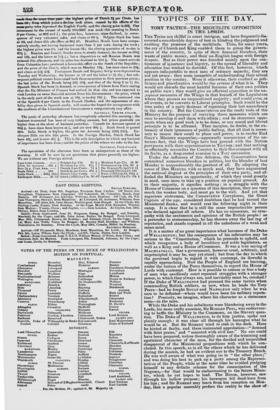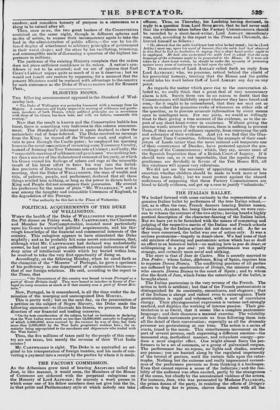TOPICS OF rrn R DAY.
TORY TACTICS—THE MIGUELITE OPPOSITION /N THE LORDS.
THE Tories axe skilful in court intrigue, and have frequently discovered a considerable degree of tact in blinding thejudgment and exciting the passions of the multitude. Thus, for many years,. the cry of Church and King enabled them to grasp the government of the country, in spite of their financial blunders, their waste of public money, and their ua-English league with foreign despots. But as their power was founded mainly upon the continuance of ignorance and bigotry, so the spread of liberality and education has worked its downfal. Of this fact, however, which appears indisputable to most men of ordinary sagacity, they are not yet aware : they seem incapable of understanding their actual position in the country. Were it otherwise, their conduct as politicians and placehunters would be the reverse of what it is. They would not obtrude the most hateful features of their own politics on public view ; they would give an effectual opposition to the unpopuiar measures of the Whigs in that bmnch of the Legislature where they possess an unquestioned majority ; and wouhrseent, at all events, to be converts to Liberal prineiples. Such would be the true policy of a party desirous of regaining their lost ascendancy in the country. But the Conservatives are the ready tools of the Ministry for the purpose of carrying those measures which are sure to envelop it and them with odium ; and its strenuous opponents when any good work is to be done, or any sound and liberal principle is to be affirmed. They imagine, no doubt, in the extremity of their ignorance of public feeling, that all that is necessary to insure their recall to place and power, is to render Earl GREY'S Ministry unpopular,—apparently unconscious of the notorious fact, that the Whigs have lost ground with the Nation paripassu with their approximation to Toryism; and that nothing so effectually reconciles the Country to their Government with all its faults, as a deep-rooted aversion to a Tory succession.
Under the influence of this delusion, the Conservatives have committed numerous blunders in politics, but the blunder of last Monday is unquestionably the greatest of all. By adopting the cause of Don IV/mum. with so much zeal, they have augmented the national disgust at the principles of their own party, and afforded the Ministers an opportunity, of which they stood greatly in need, once more to take up a position on popular ground. As to their majority, it signifies nothing : in a struggle with the House of Commons on a question of this description, they are very much the weaker body, and must go to the wall. And yet that sagacious statesman, the Conservative Coryphmus, the Great' Captain of the age, considered doubtless that he had turned the Ministerial flanks, and would rest the following night in their camp. It is clear that he is still the same impracticable person who declared against all reform. He has no connexion, no sympathy with the sentiments and opinions of the British people : as a pretender to statesmanship, he has thrown away the last rag of • reputation, and stands exposed in all the nakedness of a weak and mean mind.
It is a matter of no great importance what becomes of the Dukeof WELLINGTON; but the consequence of his infatuation may be serious to the "Constitution," which he pretends to uphold, and which recognizes a body of hereditary and noble legislators, as well as a King and a House of Commons. It was a true saying of MACHIAVELLI, that a government, however cruel, arbitrary, and unprincipled it may be, may yet stand; but from the day in which the governed begin to regard it with contempt, its downfal is rapidly approaching. Now the People of England are learning, under the tuition of the Peers themselves, to regard the House of' Lords with contempt. How is it possible to esteem or fear a body of men who needlessly court repeated struggles with a stronger power, in which they always are, and inevitably must be, crushed? If the Duke of WELLINGTON had pursued the same tactics when commanding British soldiers, as now, when he leads the Tory Peers—had he fought SOULT and NAPOLEON only when he was sure to be defeated—where would have been his military reputation? Precisely, we imagine, where his character as a statesman rests—in the mire While the Duke and his subalterns were blundering away in the
Lords, his more crafty associate, Sir ROBERT PEEL, was endeavouring to battle the Ministry in the Commons, on the Slavery question. The Duke of WELLINGTON, to do him justice, spoke out plainly enough : it was clear all through his harangue what he would be at. But Sir ROBERT tried to stab in the dark. Here he hinted at faults, and there insinuated approbation—" damned with faint praise," and "assented with civil leer." No one could have been prepared, unless thoroughly aware of the trimming and egotistical character of the man, for the decided and unqualified disapproval of the Ministerial propositions with which he concluded. In this speech, as in all the others which he has delivered during the session, he had an evident eye to the Treasury Bench. He was well aware of what was going on in '6 the other place ;" and was doing his best to pick up a party among the Representatives of the People, while at the same time he avoided pledging himself to any definite scheme for the emancipation of the Negroes,—for that would be embarrassing to the future Ministry, which he yet hopes to lead. The House, however, saw through his hollow purpose; his harangue fell dead-born from his lips ; and Sir Resew may learn from his reception on Monday, that a popular assembly prefers the reality to the show of candour, and considers honesty of purpose in a statesman as a thing to be valued after all. Thus, once mare, the two great leaders of the Conservatives contrived en. the same night, though in different spheres and suedes of action, to espose their incompetency again to take the lead in the administration of public affairsa-alie one by his illtimed display of attachment to arbitrary principles of government in their worst shape; and the other by his vacillating, trimming, and contemptible mode of discussing a question of the highest importance to millions. The partisans of the existing Ministry complain that the nation does not place sufficient confidence in its rulers. A nation's confidence is not to be extorted; and we are of opinion that Earl GREY'S Cabinet enjoys quite as much of it as it deserves ; but we would not insult our readers by supposing for a moment that the present Ministers could be replaced with advantage to the country by such statesmen as the Duke of WELLINGTON and Sir ROBERT PEEL.,



















 Previous page
Previous page